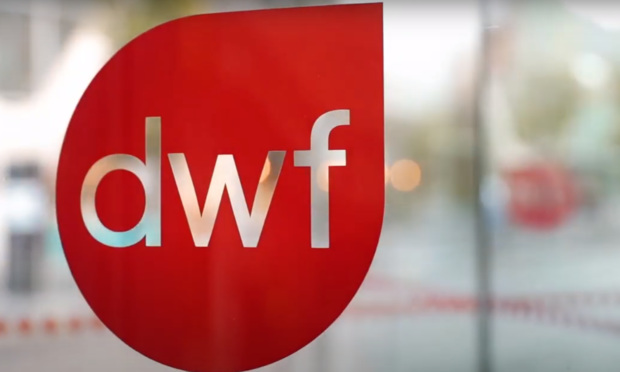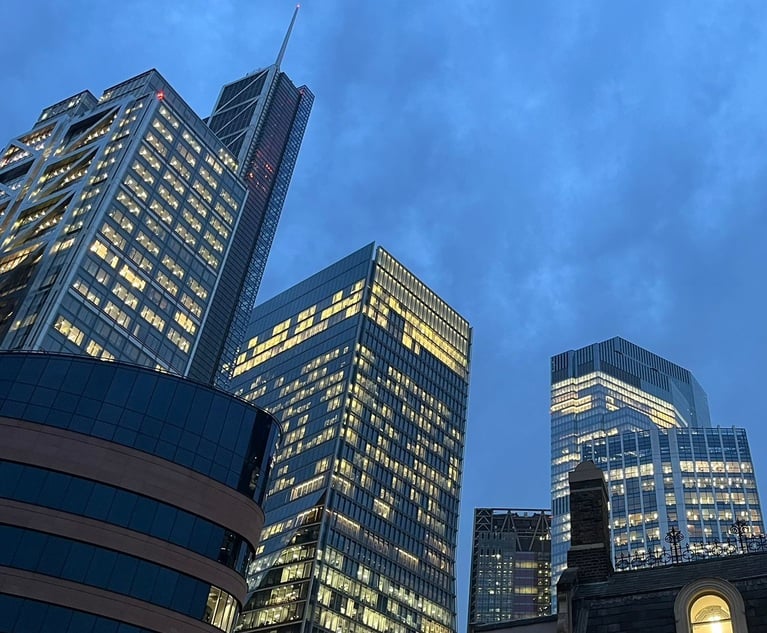'The Market Deserves an Explanation': What's Going On At The UK's Largest Listed Firm?
Last week's shock departure of DWF's leader of 14 years "suggests something has gone dramatically wrong," says one rival.
June 02, 2020 at 07:26 AM
8 minute read
 DWF has seen its share price collapse.
DWF has seen its share price collapse.
Only three months ago, DWF was riding high. The U.K.'s largest listed law firm had achieved its highest share price since listing, had posted a double-figure uptick in revenues for the year, and had just finished another in a long line of expansive acquisitions.
But the COVID-19 pandemic mercilessly halted the firm's ascendance. And the fall from grace culminated in last week's shock announcement that the firm's leader of 14 years, Andrew Leaitherland, was to leave the firm.
At a time when listed law firms are already struggling against the COVID-19 disquiet, the departure sent the firm's share price plummeting a further 20%, leaving the market bewildered, with many pondering the firm's future.
"It's unusual for a CEO to be removed like that in any context, never mind at a law firm," said one capital markets partner at a rival firm, adding: "It suggests something has gone dramatically wrong when your CEO leaves as suddenly as that."
Announcing the leadership change on Friday, the firm said Leaitherland was being replaced as group CEO and managing partner by current chairman, Sir Nigel Knowles, pegging the move squarely on COVID-19. The firm-issued statement read: "In responding to the challenges created by COVID-19, the board believes that strong and experienced leadership is essential."
"It suggests something has gone dramatically wrong when your CEO leaves as suddenly as that."
But as a law firm consultant asks: "How does DWF define experienced leadership?"
Under Leaitherland's stewardship, the firm has since 2006 grown from a two office outfit into an international player that counts 33 offices across four continents. And in a landmark move, he last year steered the firm to the U.K.'s first ever law firm main market IPO.
The firm clearly feels it owes something to Leaitherland judging by the shares it has allowed him to keep. According to a statement released upon his departure, the firm is clawing back 30% rather than 60% of his capital, despite the fact that he is leaving within the two-year lock-up period that was agreed ahead of the IPO. Though he is entitled to 40% of his shareholding, the firm has decided against clawing back the rest as it is entitled to do, and is allowing him to keep half his remaining shares "in recognition of [his] contribution to the business during his tenure". Even against a depleted share price of around 67p, this equates to £3.3 million as opposed to £1.9 million.
Such a move could add confusion to an already confusing situation. One member of a rival listed law firm says, "dumping their leader of a decade and a half" has only "heightened uncertainty… at a time when stability and security are cherished above all other conditions".
The same partner said: "If there's one thing investors hate more than anything else, it's not knowing why. Why did [DWF] let [Leaitherland] go? What are the details? The guy who led [the firm] from some unknown little business up north to, well, relative fame."
He added: "Fourteen years is a long time to lead a firm, and it just doesn't seem enough to blame COVID. The market deserves an explanation."
"It just doesn't seem enough to blame COVID"
DWF and Leaitherland declined to comment.
Cost cutting
In its stock market announcement the firm revealed it has struggled in recent months, announcing a lower than expected revenue growth of between 15% and 20%; an underperforming Middle East practice; declines in its corporate, commercial, litigation and real estate divisions; and single rather than the anticipated double-digit growth in its previously celebrated insurance division.
The firm also has relatively high levels of debt compared with other law firms.
"As a result of this underperformance, the group is planning further actions to protect margin," the announcement said. The firm said it expects a cost cutting plan to provide £10 million of savings by 2021 and £13.5 million by 2022.
Such moves have become commonplace as firms attempt to navigate the unusual economic environment amid the pandemic, but to implement them while also changing leadership places DWF into "uncharted territory", according to a lawyer with knowledge of DWF's inner workings. Having to take such actions in public view could easily put others off pursuing a listing.
"The whole concept of a listed law firm is relatively new," the person said. "[DWF] was the firm beating a trail on this."
"Dumping their leader of a decade and a half has only heightened uncertainty at a time when stability and security are cherished above all other conditions."
Echoing this point, another partner close to the 2019 IPO said: "People will ask what are the reasons behind the departure… it was all very public, so the market will want answers quickly. But only a few people will hold the key to this. Do they seek a culture shift, was it [Leaitherland's] leadership style, is it part of a wider non-COVID strategy?"
Sending a signal
The consultant suggests that, in desperate times, the firm needed to send out a "signal" that people "needn't worry about the falling share price" as "a revolution was taking place".
"The market needed something. Fears needed to be allayed. So they took pretty much the most drastic sort of action you can take in these scenarios. They hoofed out their leader and ushered in a new one."
One law firm accountant echoes this point, suggesting that unlike the "gentelmanly, collegiate world of the LLP", in the listed world "sudden sackings of CEOs are a relatively frequent occurrence". He uses the recent sacking of Aston Martin's CEO as a suitable analogy—again a leader who marshalled his company through an IPO, but found himself the sacrificial lamb when things went awry.
He adds: "A governance coup is rare in an LLP… the difference is external shareholders. LLP partners tend to be more sanguine about demanding a return on their investment. But in the listed market – the view is that things are more short term.
"DWF's share price had declined from its listing price. But shareholders want to see a share price increase. Quite often, being seen to be doing something decisive gets a positive response. Investors are seeking decisive management."
And yet, the market's fears have yet to be quelled. Since the announcement on Friday, DWF's share price has fallen another 18% to 67% – a far cry from its all-time high of 142p just three months ago.
The law firm consultant suggests that "investors will have panicked". He adds: "The share price was ebbing for months. They were wondering how long this was going to last and how much of their money was at risk, and whether [the firm] could turn it around. They needed a revolution. Something that could force the tide against the competing tide of the pandemic."
One former DWF lawyers agreed that shareholder jitteriness was at the heart of the latest price fall: "It's partly instability, and partly because people are worried about what the cause has been [for the departure]."
Knowles' goodwill
The capital markets partner added: "I suspect the vast majority of investors would have looked at the announcement and thought something else is going wrong for him to go to so suddenly, and to bring someone in like Nigel suggests that there's probably a bigger issue in the organisation than has been announced."
As to whether they can pull through this period of great uncertainty, the consultant is, however, upbeat, believing that Knowles has the clout and esteem necessary to pull it off.
"Let's not forget, Knowles has huge goodwill in the City," they said. "Before DWF, no one knew about Leaitherland. But Knowles had stores of approbation. He was the guy that turned DLA Piper into a global phenomenon."
He suggests the share price dip will be "temporary" and that DWF's recent struggles are not necessarily any greater than those of the other listed firms.
"I mean, what firm isn't suffering as a result of [coronavirus]."
However, describing the firm's Friday announcement as "pithy but mostly devoid of a real explanation", he warns: "It's now a case of offering the market an explanation. Things like this can't go unexplained for long. Investors worry, people grow wary."
Read more
DWF's Andrew Leaitherland Replaced as CEO Amid COVID-19 Woes
This content has been archived. It is available through our partners, LexisNexis® and Bloomberg Law.
To view this content, please continue to their sites.
Not a Lexis Subscriber?
Subscribe Now
Not a Bloomberg Law Subscriber?
Subscribe Now
NOT FOR REPRINT
© 2025 ALM Global, LLC, All Rights Reserved. Request academic re-use from www.copyright.com. All other uses, submit a request to [email protected]. For more information visit Asset & Logo Licensing.
You Might Like
View All
The Merricks-Mastercard Fallout: ‘Defendants Will Be Rubbing Their Hands with Glee’

‘Raises More Questions Than Answers’: Partners Puzzled by Leadership Change at UK Competition Regulator

Trending Stories
Who Got The Work
J. Brugh Lower of Gibbons has entered an appearance for industrial equipment supplier Devco Corporation in a pending trademark infringement lawsuit. The suit, accusing the defendant of selling knock-off Graco products, was filed Dec. 18 in New Jersey District Court by Rivkin Radler on behalf of Graco Inc. and Graco Minnesota. The case, assigned to U.S. District Judge Zahid N. Quraishi, is 3:24-cv-11294, Graco Inc. et al v. Devco Corporation.
Who Got The Work
Rebecca Maller-Stein and Kent A. Yalowitz of Arnold & Porter Kaye Scholer have entered their appearances for Hanaco Venture Capital and its executives, Lior Prosor and David Frankel, in a pending securities lawsuit. The action, filed on Dec. 24 in New York Southern District Court by Zell, Aron & Co. on behalf of Goldeneye Advisors, accuses the defendants of negligently and fraudulently managing the plaintiff's $1 million investment. The case, assigned to U.S. District Judge Vernon S. Broderick, is 1:24-cv-09918, Goldeneye Advisors, LLC v. Hanaco Venture Capital, Ltd. et al.
Who Got The Work
Attorneys from A&O Shearman has stepped in as defense counsel for Toronto-Dominion Bank and other defendants in a pending securities class action. The suit, filed Dec. 11 in New York Southern District Court by Bleichmar Fonti & Auld, accuses the defendants of concealing the bank's 'pervasive' deficiencies in regards to its compliance with the Bank Secrecy Act and the quality of its anti-money laundering controls. The case, assigned to U.S. District Judge Arun Subramanian, is 1:24-cv-09445, Gonzalez v. The Toronto-Dominion Bank et al.
Who Got The Work
Crown Castle International, a Pennsylvania company providing shared communications infrastructure, has turned to Luke D. Wolf of Gordon Rees Scully Mansukhani to fend off a pending breach-of-contract lawsuit. The court action, filed Nov. 25 in Michigan Eastern District Court by Hooper Hathaway PC on behalf of The Town Residences LLC, accuses Crown Castle of failing to transfer approximately $30,000 in utility payments from T-Mobile in breach of a roof-top lease and assignment agreement. The case, assigned to U.S. District Judge Susan K. Declercq, is 2:24-cv-13131, The Town Residences LLC v. T-Mobile US, Inc. et al.
Who Got The Work
Wilfred P. Coronato and Daniel M. Schwartz of McCarter & English have stepped in as defense counsel to Electrolux Home Products Inc. in a pending product liability lawsuit. The court action, filed Nov. 26 in New York Eastern District Court by Poulos Lopiccolo PC and Nagel Rice LLP on behalf of David Stern, alleges that the defendant's refrigerators’ drawers and shelving repeatedly break and fall apart within months after purchase. The case, assigned to U.S. District Judge Joan M. Azrack, is 2:24-cv-08204, Stern v. Electrolux Home Products, Inc.
Featured Firms
Law Offices of Gary Martin Hays & Associates, P.C.
(470) 294-1674
Law Offices of Mark E. Salomone
(857) 444-6468
Smith & Hassler
(713) 739-1250









